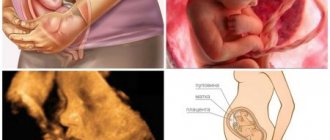During pregnancy, women begin to take better care of themselves and evaluate their inner feelings more seriously. And they can be frightened by even such a seemingly harmless thing as severe thirst. In this article we will look at whether thirst during pregnancy is so dangerous, and whether it could be a consequence or cause of some serious deviation in the development of the child.
If a woman’s pregnancy is proceeding completely normally, then frequent thirst is completely justified. If there is no swelling and you feel normal, then you can not limit your fluid intake and drink as much as your body wants and requires. But it is necessary to take into account which drinks pregnant women can drink and which they cannot.
Signs of abnormal thirst
When a person experiences constant, unquenchable thirst and wants to drink all the time, this turns into a pathology.
Moreover, a person experiences a desire to drink water even after consuming a significant amount of liquid. Thirst of a pathological nature is called “polydipsia” in the medical environment.
Unfortunately, most citizens completely ignore such alarm bells. But we must remember that some dangerous illnesses begin with just such simple symptoms. Unquenchable thirst is a signal from the body that deviations in its functioning are beginning.
To understand that thirst has become abnormal, remember how much water you drink at a time. If such a quantity is not usual for a particular person, this is a reason to think
Moreover, you should pay attention to changes in the water diet that last for a long time, when there are no additional culprits for increasing the daily water intake
Causes of thirst in later pregnancy
In addition to the fact that the increase in blood volume continues, at a later date other factors of increased thirst may appear. It is often caused by an expanding uterus, which puts increased pressure on the bladder, which in turn causes frequent urination and thus the desire to drink more fluids. It may also indicate the onset of gestational diabetes, and if thirst is combined with frequent urination and extreme fatigue, talk to your doctor.
The specialist will order a blood sugar test (glucose tolerance test), and if the result is above 140 mg/l, then there is a risk of developing the disease. Gestational diabetes is common because the body needs to produce more insulin to meet its changing needs. When there is not enough insulin, a disease begins that can be controlled by regulating sugar intake and taking injections of this hormone. If left unchecked, gestational diabetes can cause the fetus to become larger, increasing the risk of preterm birth and the likelihood of needing a caesarean section.
Pathological causes
Although most often thirst during pregnancy is a natural phenomenon and can be easily corrected by changing your diet or drinking regimen, sometimes it can become a symptom of a dangerous disease.
The most common pathological causes of thirst during pregnancy are:
- Diabetes.
- Toxicosis.
- Preeclampsia.
- Concomitant diseases.
Pathological thirst cannot be ignored. It can be suspected when you constantly want to drink and cannot satisfy this desire with any drinks. This condition requires a full examination and quality treatment, as its outcomes can be too serious.
Diabetes
Diabetes mellitus, or diabetes, can develop before conception or only during pregnancy. In the second case, it is called gestational and, with appropriate treatment after childbirth, disappears safely.
If a woman has not previously had any changes in blood sugar levels, then a sudden feeling of extreme thirst may be a sign of the onset of gestational diabetes. In addition to the desire to drink, the expectant mother may also notice other symptoms:
- Very frequent urination, or polyuria. Sometimes this symptom is called diabetes, so often you have to go to the toilet.
- Increased appetite, or, conversely, lack thereof.
- Weight loss.
- Dry skin.
- Nausea and vomiting.
The combination of such signs with the first appearance of severe thirst indicates the development of gestational diabetes and requires immediate determination of blood glucose.
If a woman had diabetes before pregnancy, then a pronounced desire to drink is associated with decompensation of this disease. This can happen during pregnancy, as sugar levels and stress on the body change significantly. But as a rule, people with a long history of diabetes know the warning signs, and if they are constantly thirsty, they consult a doctor promptly.
Toxicosis
Toxicosis in the early stages is often accompanied by vomiting. It can be one-time or, which happens more often, multiple times throughout the day. This condition can easily lead to dehydration, especially during the hot season.
With severe vomiting, the expectant mother will experience constant strong thirst. If you cannot cope with toxicosis and dehydration on your own, the woman will need hospital treatment - intravenous drip administration of fluid.
Increasing thirst against the background of vomiting is a dangerous sign.
Preeclampsia
In the second half of pregnancy, the expectant mother may experience gestosis. More often it is observed in the later stages, in the third trimester. Like toxicosis, it is a specific complication during pregnancy.
In this case, first of all, women begin to complain about the appearance of edema. However, they in no way indicate excess fluid intake. On the contrary, it is a symptom of impaired kidney function, due to which water is not retained in the vascular bed, but accumulates in the surrounding tissues. She practically does not participate in the exchange. That is why, despite the growing swelling, the expectant mother will constantly want to drink. And it is impossible to limit the flow of fluid in such a situation.
Concomitant diseases
During pregnancy, defenses decrease, and various diseases begin to attack the female body. Most often these are ARVI, colds, pathologies of the respiratory system - pharyngitis, tonsillitis and bronchitis.
These diseases are often accompanied by an increase in body temperature, which causes thirst. Also, the desire to drink arises due to the emerging dryness of the mucous membranes.
The more fluid that comes in during an illness, the faster the expectant mother will cope with it. Therefore, a wise organism reacts to the pathological process with increasing thirst.
To distinguish a pathological desire to drink from a physiological one, a doctor’s consultation and a certain examination are necessary.
Why does dry mouth occur during pregnancy?
Possible causes of dry mouth during pregnancy may be:
- Dehydration of the body. Frequent urination and vomiting are common symptoms during pregnancy, but, unfortunately, they can cause a feeling of dry mouth. Increased sweating in the summer also does not exclude the occurrence of this condition. Therefore, in order to avoid becoming a victim of dehydration, it is imperative to maintain the necessary water balance in the body by consuming a sufficient amount of clean drinking water. In late pregnancy, to avoid the possibility of swelling, it is recommended to drink in small sips or simply rinse your mouth with water.
- Impaired nasal breathing with a runny nose, which forces a woman to breathe through her mouth. The best way to get rid of dry mouth in a particular case is to cure rhinitis.
- Some diseases, such as diabetes, anemia, hypertension, inflammation in the salivary glands themselves, diseases of the gastrointestinal tract. These conditions require correction and treatment. There is a need to undergo laboratory blood tests (general and glucose) and consult specialists (therapist, dentist, ENT doctor).
- Side effects of some medications. Unfortunately, a woman cannot always do without taking medications during pregnancy, therefore, if this is the reason, then it is worth changing or completely abandoning (if allowed) the medication she is taking.
- Food cravings. Salty, spicy or smoked foods cause thirst. Don't get carried away with these foods. Salt retains water in the body, and during pregnancy this can lead to the development of edema and gestosis.
- Smoking. Unfortunately, not all women, upon learning that they are pregnant, give up such an unfortunate habit. By continuing to smoke, they not only harm the unborn child, but also do themselves a disservice.
- Stress can also sometimes cause dry mouth.
Diet during pregnancy
If a pregnant woman is thirsty, then first of all, it is necessary to pay attention to the diet, and only then reduce the amount of fluid consumed. Oddly enough, but limiting fluid intake can cause the formation of edema, since the body, with a lack of moisture, begins to store it.
Pregnant women are especially often concerned about swelling in the second and third trimester. Under no circumstances should this symptom be ignored, since swelling at any time can be a sign of disease.
- You should limit your consumption of spicy, salty and smoked foods, as these foods will retain water in the body.
- Doctors recommend that pregnant women eat more cabbage in any form: fresh, stewed, boiled. Cabbage contains a lot of potassium, which helps remove excess fluid from the body. Potassium is also found in potatoes, zucchini, apples, cucumbers, and apricots.
Advice! Potassium is also contained in tomatoes, but this product should be limited in a pregnant woman’s diet, since tomatoes contain a lot of salt.
- Sweets should also be consumed in limited quantities, as they will increase the feeling of thirst. In addition, in the second and third trimester, sweets should also be limited because eating sweet foods leads to excess weight gain.
What can pregnant women drink?
It is best for a pregnant woman to drink mostly ordinary purified drinking water; herbal teas, fruit drinks, milk, and freshly squeezed juices will also be useful. Sometimes you can drink coffee.
Even if a pregnant woman is very thirsty, it is strictly forbidden to drink Sprite, Coca-Cola and other carbonated drinks. They disrupt digestion and also cause fermentation in the intestines, which increases the risk of uterine tone, and this can cause premature birth and miscarriage.
You should also not overuse strong black and green tea and coffee, as drinking these drinks can lead to increased blood pressure. And, of course, drinking alcoholic beverages is unacceptable.
Advice! Store-bought juices from bags should be consumed as little as possible. There is no benefit from them, since such juices are concentrates with sugar and preservatives.
During pregnancy, much attention is paid to herbal drinks and infusions. They contain many microelements, vitamins, enzymes, and other substances beneficial to pregnant women.
Advice! Even such a healthy drink should not be drunk all the time, even lingonberries and chamomile.
You can also brew compotes and fruit drinks. Such drinks are not only tasty, but also very healthy. Compotes are cooked for five minutes. If you want to cook dried fruit compote, then raisins should be boiled for 5 minutes, dried apricots and prunes - 10 minutes, and pears and apples - 30 minutes.
What mineral water can pregnant women drink?
Pregnant women should drink mineral water with caution. It is better not to drink medicinal mineral waters, such as Borjomi or Essentuki. For a pregnant woman, the ideal option would be table mineral water with a low degree of mineralization, since such water contains few salts, no heavy metals, active chlorine and other harmful impurities.
Advice! Before buying and drinking mineral water, you must carefully study the label. You should not buy artificially mineralized water.
You should avoid drinking water with gas, as such drinking can cause heartburn. It is especially important to give up carbonated water in the third trimester, when the enlarged uterus puts pressure on the stomach, which provokes the reflux of gastric juice into the esophagus.
If a woman experiences severe thirst in any trimester of pregnancy, it is best to consult a doctor. After examination and examinations, the doctor will be able to identify the reasons why thirst appeared during pregnancy and give specific recommendations.
What to do if the expectant mother drank alcohol without knowing about pregnancy
Nowadays, planning your pregnancy in advance is very popular. Future mothers and fathers begin to lead a healthy lifestyle, visit a doctor, take the necessary tests, and also psychologically prepare to become parents. However, not everything in life can be planned in advance.
This especially applies to the birth of a baby, because the news that a woman and a man will become parents sometimes comes as a surprise to them. Also, unfortunately, there are often situations when a woman learns about pregnancy and its terms and realizes with horror that just before conception she or her partner drank alcohol. In addition, sometimes the expectant mother, not knowing about her situation, drank alcohol in the first weeks of pregnancy before the delay.
Will this affect the child's health?
Some mothers claim that they drank alcohol when they did not know that they were pregnant. They wonder: “Will this harm the baby?” This happens quite often. Many women drink alcohol at 3 or 4 weeks, i.e. before they find out they are pregnant. Perhaps a few glasses of alcohol will not harm the child, but in the future it is necessary to avoid alcohol consumption.
Doctors warn women against terminating pregnancy. The fact is that many expectant mothers, realizing that they drank a decent dose of alcohol while pregnant, have an abortion. They are afraid that the child will be born with significant disabilities.
If you think you have a drinking problem, talk to your pregnancy care provider. Any doctor wants to help his patient, so the doctor will tell you what to do in this situation.
Is it possible to drink tea during pregnancy?
A pregnant woman is responsible not only for her own health, but also for the health of her developing fetus inside her tummy, which is why she needs to be very careful in her diet, and especially in the use of various herbs, such as tea. In this topic we will tell you whether a pregnant girl can drink tea, as well as the benefits and harms of drinking it during pregnancy
IS IT POSSIBLE TO DRINK TEA DURING PREGNANCY?
It is worth noting that any tea contains caffeine, and caffeine, as you probably know, is harmful to the health of not only the nascent organism, but also for a mature adult. Tea for a developing fetus is harmful because the baby developing in your belly is not yet developed, and folic acid is required for its development, and when caffeine enters the body of a pregnant woman, the fetus’s absorption of this very acid is prevented, which certainly affects its slowdown. development. Therefore, if you really want to drink a cup of sweet tea, don’t do it more than once a week, and then you shouldn’t have any special problems, but if you drink tea every day, and even several times a day, then, of course, it is better for you to discuss this issue with your gynecologist, who, depending on the results of the examination, will give the go-ahead or refuse to drink tea during pregnancy. We recommend that you familiarize yourself with SYMPTOMS OF EARLY MISCARRIOR
WHAT TEA SHOULD NOT BE DRINKED DURING PREGNANCY
We do not recommend drinking any tea at all, but if you really want to, you can drink a cup of weak tea no more than once a week.
GREEN TEA: Green tea differs from black tea only in its preparation, that is, fermentation; green tea is almost natural dried green leaves or tea leaves that have undergone minimal fermentation (oxidation under high air temperature).
BLACK TEA: The same tea leaves as green tea, except that they have gone through a full cycle of tea leaf fermentation and become more tart and aromatic.
Is it normal to be very thirsty in early pregnancy? or.
Fine! I just asked the gynecologist today)) Other answers Ask your doctor, he knows your state of health. At the very beginning of pregnancy, I often wanted clean water. Student (142) 5 years ago I drank 3-4 liters of fluid a day throughout my pregnancy, the doctors told me to limit myself, but I didn’t listen, and the result was 20 kg. gained, and 80% of them over the past two months. There is a special herbal infusion that is completely harmless and suppresses thirst during pregnancy. Guru (4205) 5 years ago what kind of infusion is this? very nasty?
thirst during pregnancy. For all
Thirst during pregnancy: causes and useful tips
During pregnancy, women begin to take better care of themselves and evaluate their inner feelings more seriously. And they can be frightened by even such a seemingly harmless thing as severe thirst. In this article we will look at whether thirst during pregnancy is so dangerous, and whether it could be a consequence or cause of some serious deviation in the development of the child.
Why does thirst increase during pregnancy?
What mineral water can pregnant women drink?
If a woman’s pregnancy is proceeding completely normally, then constant thirst during pregnancy is completely justified. If there is no swelling and you feel normal, then you can not limit your fluid intake and drink as much as your body wants and requires. But it is necessary to take into account which drinks pregnant women can drink and which they cannot.
Why does thirst increase during pregnancy?
Some women believe that thirst is a sign of pregnancy. But it is not so. Yes, severe thirst can be caused by changes in the body and other reasons caused by pregnancy, but it should not be regarded as a sign of pregnancy. If a pregnant woman is very thirsty, this may be due to the following reasons:
Pregnant women exhibit a variety of symptoms: accumulation of gases (flatulence), cravings for salty and sweet foods, moodiness, tearfulness, nausea and increased pigmentation. But thirst during pregnancy is not a sign of future motherhood. However, it can become his integral companion. This factor cannot be ignored, and first it is necessary to find out the reasons for the body’s increased need for fluid.
Why does thirst increase during pregnancy?
Some women believe that thirst is a sign of pregnancy. But it is not so. Yes, thirst in the early stages can be caused by changes in the body and other reasons caused by pregnancy, but it should not be regarded as a sign of pregnancy. If a pregnant woman is thirsty, this may be due to the following reasons:
- During pregnancy, a woman experiences severe stress, since her body needs to maintain not only its metabolism, but also meet the needs of the child.
- In the first trimester, internal restructuring of the body occurs. This increases the number and speed of chemical reactions taking place in the body, and, accordingly, the need for fluid.
- In addition, during the normal course of pregnancy, the volume of amniotic fluid gradually increases, which is why the woman may also be tormented by severe thirst. A particularly rapid increase in the volume of amniotic fluid is observed in the second trimester, when the fetus is actively growing. But strong thirst in the first trimester appears due to a change in a woman’s taste preferences.
- However, thirst can be a manifestation of a disease. If you suddenly become very thirsty, this may be a sign of diabetes, as well as the presence of a microbial or viral disease, including various infections of the respiratory and urinary tract, and gastrointestinal tract.
Why does the need for water increase during pregnancy?
During pregnancy, a woman's body experiences additional stress. After all, he needs not only to maintain his own metabolism, but also to provide the energy and nutritional needs of the growing fetus, as well as the restructuring of the mother’s organs (increase in the volume of the uterus and mammary glands, increase in the subcutaneous fat and muscle layer). All this increases the speed and number of chemical reactions taking place in the mother’s body, and therefore the need for water.
In addition, due to the poor functioning of the fetal organs responsible for neutralizing the resulting waste, the kidneys and liver of a pregnant woman need more fluid to remove toxic waste from the body.
For the correct development of the baby during its intrauterine growth, a gradual increase in the volume of amniotic fluid is required, which also increases the feeling of thirst in the expectant mother.
The restructuring of a woman’s body necessarily affects the hematopoietic system. After 20 weeks of gestation, there is an increase in the formation of red blood cells. This is necessary to ensure the delivery of sufficient oxygen to the growing fetus. The increased blood volume is also a kind of safety net for the mother herself: the consequences of the inevitable blood loss during childbirth are much less apparent. Nature took care of protecting a woman’s life by increasing the activity of the blood coagulation system. But if the expectant mother severely limits her fluid intake, excessively thick blood can become a threat to her health: the likelihood of the formation of intravascular blood clots in any organs with the development of ischemic damage, including infarction of the kidney, brain or heart, increases.
Of no small importance in exacerbating the feeling of thirst is a change in the taste preferences of a pregnant woman. After all, pickled cucumbers, sauerkraut, pickled vegetables or smoked meats eaten with pleasure require a lot of liquid to remove increased amounts of salt and spices from the body
And the sudden craving for sweets and baked goods will also increase thirst.
Today, during a normal pregnancy, obstetricians do not recommend limiting fluid intake, while at the same time advising not to abuse foods that cause thirst. And at the first signs of toxicosis, increasing the amount of water you drink helps reduce the severity of its manifestation.
Why do you always want to drink during pregnancy?
Experts are confident that there are two types of factors that cause severe thirst during pregnancy: chronic diseases and pathological conditions, as well as normal physiological processes:
- It must be remembered that all metabolic processes and biochemical reactions in the body occur through fluid. During pregnancy, these phenomena become more frequent, the woman’s body experiences increased stress and spends more energy. Hence the increased need for drinking;
- due to accelerated metabolism, the kidneys have to work in an intensive mode “without days off”, it is not surprising that a woman is very thirsty during pregnancy, and a feeling of thirst accompanies her both day and night;
- against the background of a constant increase in the amount of amniotic fluid, the expectant mother’s body suffers significant moisture losses, so she has to drink a lot and often;
- If a pregnant woman has undergone a change in taste preferences, and the amount of salty foods in her diet has increased, the body tries to remove excess salt. Naturally, you have to drink more water to make it easier for the kidneys to work;
- Due to the activation of the hematopoietic system, which prevents the formation of blood clots, the accumulation of fluid in the vascular system automatically increases, which is the cause of severe thirst during pregnancy.
Also, the need for water may arise against the background of some disease . For example, diabetes, viral infection, bronchial diseases or gastrointestinal disorders. By the way, blood sugar levels in pregnant women are often elevated. If this fate has befallen you, you should consult your doctor about your diet.
Sometimes a woman constantly wants to drink during pregnancy due to decreased hemoglobin . If you are anemic, it is not surprising that your body needs a lot of water.
There are situations when edema , but thirst during pregnancy only intensifies. It would seem that it is worth limiting your fluid intake, but no - the body needs water even more than before. The fact is that an actively growing fetus takes a lot of protein from the mother and “eats” muscle mass. In this case, you can reduce swelling and prevent blood thickening by giving up fast carbohydrates - baked goods, sugar, sweets, and instead increasing your consumption of proteins and foods containing protein.
If you feel thirsty all the time, especially at night, talk to your doctor about your concerns. Sometimes thirst signals such a serious illness as gestosis , so let a specialist prescribe additional tests to be on the safe side.
As you can see, the reasons why you may be extremely thirsty during pregnancy are quite clear. Now let’s figure out what drinks can quench it.
Faithful helpers in the fight against thirst
Naturally, if you really want to drink during pregnancy, then you need to fight thirst, and not endure it. Fortunately, the range of drinks is quite wide:
- Water. Of course, the first and most correct thing is simple clean water. Not only does it satisfy thirst best, but there are no contraindications to it;
- Mineral water. You need to be careful with this drink. It is better to avoid medicinal waters, but canteen water can be consumed within reasonable limits. In this case, it is better to choose mineral water without gas, so as not to burden the intestines. It is also worth paying attention to the composition and making sure that this water is mineralized naturally and not artificially;
- Juices. Of course, drinks made from fresh vegetables and fruits are beneficial for expectant mothers and their babies. But you should approach the choice of juices with all responsibility, because their abuse is fraught with various complications. First of all, try to eliminate packaged or bottled juices from your diet. Product manufacturers often do not disdain sweeteners, flavors and preservatives. There will be no benefit from such a drink at all. Also keep in mind that exotic juices such as pineapple or mango are made from fruits that have undergone long-term transportation and storage, not always under favorable conditions. It is advisable to drink domestically produced nectars from apples, cherries, plums, and carrots grown in the CIS. But it is best to drink a drink made from freshly squeezed berries or fruits, prepared with your own hands. To do this, you need to choose not too beautiful raw materials at the market (but not in the supermarket) - these usually do not contain pesticides and nitrates. But do not forget that sweet juices can only increase thirst during pregnancy. Therefore, dilute them with water 1:1 and consume in moderation;
- Fruit drinks. Fresh cranberry or lingonberry juice is a great way to cope with thirst;
- Teas and decoctions. Both black and green teas contain significant amounts of caffeine, so they are on the list of questionable drinks for pregnant women. But if you cannot refuse them at all, choose varieties carefully, do not abuse additives that can cause allergies, and do not abuse the strength of the drink. It is best to drink tea no more than 2 times a day, giving up sugar in favor of honey. And if possible, switch to rosehip decoctions, dried fruit compote (uzvar), jelly, chamomile or mint tea.
For a pregnant woman, moderation in drinking, as in everything else, is important. Drink no more than two liters of fluid per day and be healthy!
We recommend reading: Watermelon is great for quenching thirst. Find out if pregnant women can eat watermelon
Partner news
Thirst during pregnancy: causes and useful tips
During pregnancy, women begin to take better care of themselves and evaluate their inner feelings more seriously. And they can be frightened by even such a seemingly harmless thing as severe thirst. In this article we will look at whether thirst during pregnancy is so dangerous, and whether it could be a consequence or cause of some serious deviation in the development of the child.
The content of the article:
Why does thirst increase during pregnancy?
What can pregnant women drink?
Diet during pregnancy
What mineral water can pregnant women drink?
If a woman’s pregnancy is proceeding completely normally, then constant thirst during pregnancy is completely justified. If there is no swelling and you feel normal, then you can not limit your fluid intake and drink as much as your body wants and requires. But it is necessary to take into account which drinks pregnant women can drink and which they cannot.
Why does thirst increase during pregnancy?
Some women believe that thirst is a sign of pregnancy. But it is not so. Yes, severe thirst can be caused by changes in the body and other reasons caused by pregnancy, but it should not be regarded as a sign of pregnancy. If a pregnant woman is very thirsty, this may be due to the following reasons:
During pregnancy, a woman experiences severe stress, since her body needs to maintain not only its metabolism, but also meet the needs of the child.
Also at this time, internal restructuring of the body occurs. This increases the number and speed of chemical reactions taking place in the body, and, accordingly, the need for fluid.
In addition, during the normal course of pregnancy, the volume of amniotic fluid gradually increases, which is why the woman may also be tormented by severe thirst. Also, strong thirst in the early stages of pregnancy appears due to changes in a woman’s taste preferences.
However, thirst can be a manifestation of a disease. If you suddenly become very thirsty, this may be a sign of diabetes, as well as the presence of a microbial or viral disease, including various infections of the respiratory and urinary tract, and gastrointestinal tract.
What can pregnant women drink?
It is best for a pregnant woman to drink mostly ordinary purified drinking water; herbal teas, fruit drinks, milk, and freshly squeezed juices will also be useful. Sometimes you can drink coffee.
Even if you are very thirsty during pregnancy, it is strictly forbidden to drink Sprite, Coca-Cola and other carbonated drinks. They disrupt digestion and also cause fermentation in the intestines, which increases the risk of uterine tone, and this can cause premature birth and miscarriage.
You should also not overuse strong black and green tea and coffee, as drinking these drinks can lead to increased blood pressure. And, of course, drinking alcoholic beverages is unacceptable.
Note. Store-bought juices from bags should be consumed as little as possible. There is no benefit from them, since such juices are concentrates with sugar and preservatives.
During pregnancy, much attention is paid to herbal drinks and infusions. They contain many microelements, vitamins, enzymes, and other substances useful for pregnant women.
Note. Even such a healthy drink should not be drunk all the time, even lingonberries and chamomile.
You can also brew compotes and fruit drinks. Such drinks are not only tasty, but also very healthy. Compotes are cooked for five minutes. If you want to cook dried fruit compote, then raisins should be boiled for 5 minutes, dried apricots and prunes - 10 minutes, and pears and apples - 30 minutes.
Diet during pregnancy
If you are thirsty during pregnancy, then first of all, you need to pay attention to your diet, and only then reduce the amount of fluid you consume. In addition, if fluid is retained in the body, edema will form.
You should limit your consumption of spicy, salty and smoked foods, as these foods will retain water in the body.
Doctors recommend that pregnant women eat more cabbage in any form: fresh, stewed, boiled. Cabbage contains a lot of potassium, which helps remove excess fluid from the body. Potassium is also found in potatoes, zucchini, apples, cucumbers, and apricots.
Note. Potassium is also contained in tomatoes, but this product should be limited in a pregnant woman’s diet, since tomatoes contain a lot of salt.
Sweets should also be consumed in limited quantities, as they will increase the feeling of thirst during pregnancy.
What mineral water can pregnant women drink?
Pregnant women should drink mineral water with caution. It is better not to drink medicinal mineral waters, such as Borjomi or Essentuki. For a pregnant woman, the ideal option would be table mineral water with a low degree of mineralization, since such water contains few salts, no heavy metals, active chlorine and other harmful impurities.
Note. Before buying and drinking mineral water, you must carefully study the label. You should not buy artificially mineralized water.
If a woman experiences severe thirst during pregnancy, it is best to consult a doctor. After the examination, the doctor will be able to give specific recommendations.
During the period of bearing a child, a woman experiences new sensations and also has a variety of complaints. There are irritable and sleepy states, pain in the back and head, taste changes, nausea occurs, and body weight increases. There are times when women constantly feel thirsty during pregnancy. Next, we will consider whether this is connected with the very expectation of the baby.
How can you relieve thirst?
In addition to drinking plenty of water, try to eat vegetables and fruits. You should also drink fresh fruit juices and milk. They contain a large amount of water and, in addition, provide the body with necessary minerals and vitamins.
While increasing your intake of water, milk and fresh fruit juices, you should simultaneously reduce your intake of salty foods and sugary carbonated drinks. Salt contains sodium, which causes the body to retain fluid and increases the risk of dehydration.
Dehydration is especially dangerous during pregnancy as it contributes to constipation, fatigue in a woman, and in severe cases can even lead to premature birth, birth defects and other problems.
When to worry?
Extreme thirst accompanied by dark yellow urine may indicate dehydration. If you drink a lot and also visit the toilet more often than usual, this may also indicate gestational diabetes. Each of these conditions can cause complications for both the baby and the expectant mother. Therefore, if they occur, it is imperative to consult a doctor.
What causes thirst during pregnancy and how to get rid of it?
In order not to burden the intestines, take mineral water without gas. Don't forget to make sure it is naturally mineralized;
The main thing is to maintain moderation: no more than two liters of fluid per day, then neither swelling nor thirst will bother you during pregnancy.
What the expectant mother eats while carrying a baby affects the course of pregnancy, well-being, and, of course, the development of the baby. A salt-free diet for pregnant women is a good helper in the fight against edema, excess weight and high blood pressure. If one of these symptoms bothers you, you should consult your doctor. Perhaps limiting salt will help correct the situation.
How to get rid of normal thirst
To avoid thirst, it is necessary to regularly replenish fluid reserves. But you need to know your own norm. It is calculated using a simple formula: every day an adult should consume about 30-40 g of liquid for every 1 kg of body weight. But when making such calculations, a number of factors should be taken into account (they increase the body’s need for water):
- stressful situations;
- active lifestyle;
- pregnancy and lactation period;
- increased ambient temperature;
- colds, infectious diseases occurring with fever, vomiting and diarrhea.
Doctors say that on average a person should drink at least 1.2-1.5 liters of liquid per day. By the way, this includes not only drinking water, but also liquid contained in food.
Causes of thirst during pregnancy
So, why do you feel thirsty during pregnancy? There are two factors that increase the body's need for water during pregnancy - chronic diseases and pathological conditions. In addition, banal physiological processes occurring in the body through fluid can also influence, and when carrying a child, these processes become more frequent. For example:
- a woman spends more energy, which is why she wants to drink;
- accelerated metabolism, due to which the kidneys work at a faster rate, hence thirst during pregnancy;
- a woman loses a lot of moisture due to an increase in amniotic fluid;
- addiction to salty foods, as a result of which the body tries to get rid of excess salt, which impedes the functioning of the kidneys;
- acceleration of the hematopoietic system, as a result of which the amount of fluid in it increases;
- elevated blood sugar levels;
- bronchial diseases;
- decreased hemoglobin.
If the appearance of thirst during pregnancy is accompanied by the formation of edema, then in no case should you limit yourself in fluid consumption, since now the body needs water even more than before. You can reduce swelling by giving up fast carbohydrates (baked goods, sweets, sugar), and instead eat proteins and foods containing protein.
If you are very thirsty both day and night, consult a doctor, as this may be a signal of a disease such as gestosis.
When to limit your fluid intake
At each visit to the obstetrician, the woman's shin circumference, weight and blood pressure are measured, and a urine test is performed. This is how the doctor makes sure that the pregnant woman does not develop obvious or hidden swelling. Increased accumulation of fluid disrupts the normal blood supply to the placenta and fetal organs, and can also serve as a symptom of a serious pregnancy complication - gestosis. Another name for this pathology – nephropathy – indicates the participation of the expectant mother’s kidneys in the mechanism of its development. There is an increased excretion of proteins in the urine, which in turn increases the pathological accumulation of fluid. When edema or gestosis appears, the doctor first of all recommends the woman a special fasting diet with limited salts and liquids.
Thirst may be a symptom of a disease
In the second half of pregnancy, under the influence of female sex hormones, the level of glucose in the blood increases. This is a physiological state for the expectant mother. But in some cases, impaired glucose tolerance and even gestational diabetes mellitus may develop, accompanied by an excessive increase in blood sugar, its excretion in the urine and thirst. Diabetes in a pregnant woman requires constant monitoring by an endocrinologist, a special diet, and, if indicated, the prescription of insulin-containing medications.
Any viral or microbial disease, including the most common infections of the urinary, respiratory tract and gastrointestinal tract, also causes an increased need for fluid.
If the expectant mother is bothered by the feeling of thirst, she should tell her doctor about it during her next visit to the antenatal clinic. After examination and examination, the doctor will give all the necessary recommendations on drinking regime and dietary restrictions, which in most cases are sufficient for pregnancy to proceed without complications.
Treatment
It is impossible to get rid of pathological thirst without treating the underlying disease. And the therapy will be different in each case:
- Insulin for diabetes.
- Saline solutions for dehydration.
- Protein preparations for gestosis.
- Anti-inflammatory or antibacterial medications in case of concomitant diseases.
However, it is equally important to maintain the correct drinking regime. And in the case of physiological thirst, this is the only treatment option.
Drinking regime
While pregnant, not all drinks are healthy. Some are categorically not recommended for quenching thirst. Pregnant women can drink:
- table water.
- weak green tea.
- compotes.
- fruit drinks.
- fresh juices.
- herbal teas (allowed during pregnancy).
Sweet carbonated water of all flavors and varieties, energy drinks, tonics, strong black tea, and coffee are prohibited.
Thirst may be common during pregnancy. But in order not to miss a dangerous disease, you must inform your doctor about it.
Causes
First of all, to ensure the vital functions of two organisms, a larger volume of blood, a special level of hormones, an increased amount of water and nutrients, as well as proper rest are needed.
Therefore, if something is not performed to the required degree or is overloaded physically or emotionally, then such an imbalance causes various symptoms, including dry mouth.
Most often, dry mouth during pregnancy occurs due to:
- Eating hot, spicy, pickled, smoked, salty foods, carbonated drinks and natural coffee.
- Changes in mineral balance, most often excess magnesium and deficiency of potassium. With the help of a special diet enriched with tomatoes, potatoes, zucchini, dried apricots and other products, you can restore the required level of minerals.
- Some medications have a feeling of thirst as a side effect. Therefore, you need to either replace the drug or abandon it. If the harm from excluding treatment is greater than discomfort, it is necessary to obtain competent advice from a doctor.
- Diseases of the circulatory or nervous system, respiratory tract.
- Dehydration as a result of toxicosis or a shift in water balance. If drinking water or non-carbonated drinks is not possible, then dehydration through a dropper is necessary.
- Diseases of the endocrine system occur quite often and are associated with changes as a result of pregnancy. Therefore, to determine this factor as the main cause of dry mouth, you need to do a blood test for TSH levels.
- Diabetes in pregnant women appears due to a change in the balance in metabolic processes and hormonal functions. The symptom can pose a significant danger to the fetus and the woman. Therefore, the GTT test is performed primarily to exclude gestational diabetes.
What examinations are carried out?
The doctor will be able to make a preliminary diagnosis based on a history and examination of the patient. However, to confirm the diagnostic results, you will need to undergo a series of tests. In some cases, the expectant mother will be recommended to undergo an unscheduled ultrasound examination. The following laboratory tests may also be required:
- blood biochemistry (to identify pathologies in the functioning of the kidneys and liver);
- general blood test (helps identify the inflammatory process);
- general urine test (to determine the presence of a specific protein that appears only during gestosis);
- blood for glucose levels (allows you to confirm or deny the development of diabetes).
Symptoms
Despite the fact that xerostomia itself is a sign of pregnancy, it can be accompanied by such unpleasant sensations as:
- constant feeling of thirst;
- sore throat;
- formation of a white or yellow coating on the tongue;
- dryness and stickiness not only in the mouth, but also in the throat;
- difficulty chewing or swallowing food;
- the appearance of an unpleasant odor from the mouth;
- the formation of shallow cracks on the lips or in the corners of the mouth.
However, you should not be afraid of the manifestation of such symptoms, since they do not harm the baby, and the conditions behind them can be neutralized, and some of them after the birth of the baby.
A condition such as late toxicosis or gestosis can cause fear for the life of the expectant mother or baby. For this reason, every pregnant woman should know that the appearance of dry mouth in combination with the following symptoms should be an impetus to seek help from specialists. Such signs include:
- constant nausea and persistent vomiting;
- severe swelling;
- increase in blood pressure indicators.
In such cases, you should not expect the condition to improve on its own.
While carrying a child, female representatives are prohibited not only from certain diagnostic measures, but also from taking certain medications that can eliminate such manifestations.
You can neutralize dry mouth in pregnant women by following these rules:
- reconsider your diet. You should eat as little fatty and salty foods as possible. It is recommended to enrich the menu with fresh vegetables and fruits, which contain a large amount of vitamins and nutrients;
- completely abandon addictions that not only cause dry mouth, but also harm the fetus;
- perform oral hygiene several times a day;
- try to breathe only through your mouth;
- avoid stressful situations if possible;
- spend more time in the fresh air;
- ventilate the sleeping room;
- drink at least two liters of fluid daily.
In addition, it is very important for women during pregnancy to undergo a timely examination by an obstetrician-gynecologist.
Herbal teas
Before using any herbal drink, you must consult a gynecologist or therapist!
Blooming Sally
Contains a large amount of vitamins A, C, K, E, PP and microelements (iron, calcium, potassium, selenium, copper, magnesium, zinc, phosphorus). Does not contain caffeine. It has calming, analgesic and anti-inflammatory properties. Helps with coughs, sore throats, relieves fever, gets rid of heartburn, insomnia, and stress. The drink also prevents the development of anemia during pregnancy, as it helps increase hemoglobin levels. Improves the condition of hair and nails.
To prepare the drink, you need to brew 1.5 tablespoons of the dry plant with 2 cups of hot boiled water and let it brew for a few minutes. After which the drink is ready to drink. You can drink no more than 2 cups a day for a month, then take a break for 3 weeks.
Contraindicated for varicose veins, thrombophlebitis.
With mint
Mint is a healthy, aromatic plant that can improve your mood, give you vigor, and improve your health. It contains essential oils, dietary fiber, vitamins A, C, PP, group B, phosphorus, calcium, sodium, iron, zinc, copper, manganese, amino acids, tannins.
Drinking mint tea during pregnancy effectively helps with morning sickness. It improves digestion and helps fight swelling. The drink is indispensable for colds or viral illnesses. It improves digestion and relieves constipation. A mug of mint tea will help a pregnant woman calm down, sleep well, and wake up in the morning in a good mood.
To prepare the drink, you need to pour 5-10 fresh mint leaves with 2 glasses of boiled water at a temperature of 80 °C. Leave to infuse for 5-10 minutes. You can add a slice of lemon, sugar or a spoonful of honey to it.
The permissible amount is 3 cups per day.
Long-term use and large quantities of mint drink can negatively affect the course of pregnancy. Phytoestrogens contained in the plant can cause increased uterine tone and premature birth.
With rose hips
Rosehip is the leader in vitamin C content (ascorbic acid). The composition also contains other useful substances - vitamins A, E, P, K, B2, essential oils, fiber, pectins, tannins, polysaccharides, magnesium, potassium, calcium, phosphorus, sodium, chromium, copper, cobalt, manganese.
Consuming it during pregnancy brings tangible benefits to the body:
- strengthens the immune system;
- protects against colds and fungal diseases;
- reduces cholesterol levels;
- helps with diarrhea;
- eliminates swelling;
- improves tissue regeneration;
- diuretic effect;
- fights elevated body temperature.
To prepare tea you will need 2.5 tablespoons of dried rose hips, which are poured with 500 ml of boiled water. Leave to infuse for 10-15 minutes. Rosehip decoction can be mixed with green or black tea. You can drink no more than 3 cups per day.
It is not recommended to drink a decoction with rose hips in the first trimester, in case of impaired kidney function, constipation, thrombophlebitis, gastrointestinal tract disease, or sensitive tooth enamel.
With chamomile
Chamomile is a wildflower containing a lot of useful substances. The drink made from it has the following properties:
- alleviates toxicosis;
- effective during exacerbation of thrush during pregnancy, as it destroys Candida fungi;
- relieves nervous excitement;
- helps with constipation, bloating, eliminates intestinal spasms;
- has a bactericidal, wound-healing, analgesic effect;
- stabilizes blood pressure.
It’s easy to prepare a chamomile drink - just pour 2 teaspoons of dried flowers into a glass of boiling water and leave to steep for 3 hours. Strain before use. Pregnant women can take 1 cup per day.
Although chamomile infusion is beneficial, it must be used with caution. It can cause an allergic reaction, headaches, and irritability. When consumed in large quantities, it has an irritating effect on the walls of the stomach, which can lead to the development of gastritis and ulcers. Chamomile in the first trimester can increase the tone of the uterus, which can cause miscarriage.
Thirst as a consequence of illness
Sometimes, when looking for an answer to the question of why you want to drink a lot of water, you should look for the reasons in your own health. Sometimes prolonged and unquenchable thirst becomes evidence of the onset of a certain disease. This first symptom of the disease cannot be ignored.
Diabetes
Often abnormal thirst indicates the appearance of such a dangerous pathology. Therefore, if an increased urge to drink has been observed for a long time, and especially if there is a predisposition, you should immediately visit a doctor and undergo the necessary tests.
By the way, diabetes is an insidious disease. For a long time, many patients do not even suspect that they have such an illness and do not receive the necessary treatment. Sometimes it happens that a diagnosis is made only after a sharp deterioration in health, when the patient is taken by ambulance to the hospital.
With timely diagnosis and proper treatment, a person can avoid terrible consequences. And the result of advanced diabetes mellitus is quite serious things:
Kidney failure
An increased desire to drink water may also indicate that a person has kidney problems. When you often feel thirsty, this means that the kidneys can no longer cope with their work and are not able to retain water in the body. In the presence of such a problem, there is a violation of the water-salt balance, which becomes the cause of dehydration.
Doctors define kidney failure as a pathology that accompanies various diseases. Depending on the intensity of the changes, chronic and acute renal failure are distinguished.
According to statistics, acute renal failure is diagnosed annually in 100 people out of 500,000.
Doctors attribute the following factors to the culprits of kidney failure:
- diabetes;
- organ injury;
- arterial hypertension;
- alcohol addiction;
- severe viral infections;
- illiterate use of medications.
Liver diseases
Sometimes the reasons why your mouth gets dry and you feel thirsty are various liver problems. One of the common culprits of such problems is alcohol abuse. According to WHO experts, today about 200 million people worldwide suffer from various liver diseases. Liver diseases are among the ten most common causes of death.
The functioning and condition of this organ should be checked if, along with unquenchable thirst, a person experiences the following symptoms:
- constant nausea;
- severe dizziness;
- pain in the hypochondrium.
Water, water...how much to drink during pregnancy?
Water is a unique solvent of minerals, nutrients, enzymes, oxygen, carbon dioxide and other products necessary for human life. Approximately 2500 ml of digestive juices are produced per day: saliva, secretions of the stomach and pancreas, bile. In a woman’s bloodstream there are about 3500-4000 ml of plasma with formed blood elements, while about 1200 ml of urine and sweat gland secretion are released per day. For the normal course of these intensive processes, an adequate supply of fluid is necessary.
With the onset of pregnancy, metabolic processes in the body undergo significant changes: the need for nutrients and oxygen increases, the volume of circulating blood increases, the heart and kidneys of a pregnant woman work with increased load. All this is the result of the future mother’s body adapting to the needs of the developing fetus.
Organs such as the placenta and mammary glands are especially intensively supplied with blood.
The fruit is surrounded by a shell that contains an aqueous environment. Amniotic fluid is characterized by a high rate of exchange. By the 8-9th month of pregnancy, the average volume of amniotic fluid is approximately 1000-1500 ml. The fruit not only absorbs the surrounding aquatic environment, but is itself the source of its formation.
Mineral and water metabolism undergo changes. Thus, pregnant women have a tendency to retain fluid in the body, increase the permeability of the walls of blood vessels, and retain calcium and phosphorus salts, which creates the preconditions for the formation of edema.
For the normal course of pregnancy, maintaining water-salt balance is very important.
Special cases: can pregnant women drink water if they have toxicosis?
The first trimester is the most important stage in the functional restructuring of a pregnant woman’s body. During this period (up to 12-16 weeks), pathological changes such as toxicosis of pregnant women may occur, the extreme manifestations of which are drooling and vomiting. These conditions, which have complex development mechanisms, require mandatory observation and treatment by a specialist.
In case of toxicosis in a pregnant woman, compliance with the drinking regime is required. It is necessary to replenish lost fluid, since a pregnant woman, during exacerbation of pathological conditions, can lose up to 2000 ml per day. In case of increased salivation and frequent vomiting, you should constantly drink in small sips slightly chilled drinking water, table mineral water, or perhaps with the addition of lemon slices.
The balance in such a situation is quite difficult for the pregnant woman herself to determine. Try to ensure that your daily fluid requirement is met. If you vomit, your doctor will help you calculate the amount of fluid that needs to be replaced. In severe cases, fluid is administered intravenously in the form of special nutrient solutions.
Late toxicosis (after 16 weeks of pregnancy) includes swelling of the pregnant woman, a tendency to increase blood pressure and other complications that require strict supervision by an obstetrician-gynecologist. A woman can recognize edema on her own: it is swelling of the feet, legs, hands, anterior abdominal wall, and puffiness of the face.
It is important to limit yourself in the amount of liquid administered and reduce the consumption of table salt to a minimum. The daily fluid requirement should be reduced: 1200 ml in the I-II trimester and about 1000 ml in the III trimester
Failure to comply with these rules and doctor’s recommendations can result in dangerous complications:
- overweight;
- increased blood pressure;
- increased stress on the heart and kidneys;
- disruption of the supply of nutrients and utilization of metabolic products between the placenta and the fetus;
- formation in some cases of low or polyhydramnios.
All this can lead to irreversible disorders in the development of the child.
In general, a pregnant woman’s thirst is absolutely justified. You need to drink as much as you need. If a woman gets used to constantly carrying water with her and drinking it in small sips at first desire, attacks of thirst manifest themselves much less frequently.
Why does xerostomia occur?
Among the possible causes of dry mouth during pregnancy, doctors distinguish both physiological and pathological, indicating problems in the body. These include:
- Dehydration – it occurs due to frequent urination, sweating and vomiting, and stomach upsets. And also due to increased blood flow, which must now meet the needs of not only the mother, but also the fetus.
- Gestational diabetes – occurs due to hormonal disorders, with a family history.
- Other diseases are anemia, arterial hypertension, pathologies of the gastrointestinal tract, infectious diseases.
- Rhinitis in pregnant women - in which a woman begins to breathe through her mouth instead of her nose, resulting in overdrying of the mucous membrane. Does not require any treatment and goes away after childbirth.
- Mineral imbalance – excess and deficiency of certain trace elements when taking medications or an unbalanced diet.
- Gastronomic preferences and bad habits - excess of salty, spicy foods, smoked foods.
The most common cause of dry mouth is diabetes during pregnancy. If you suspect it, you need to take a blood test for sugar and seek advice from an endocrinologist.
thirst during pregnancy!!!
But you can check your suspicions yourself by taking a pregnancy test. Today, tests can be bought at any pharmacy or supermarket, and they come with detailed instructions. By dipping a test strip into your urine, you can find out if you are pregnant. This test is best taken in the morning, immediately after waking up. This is when your urine is most concentrated and you are more likely to get an accurate result.
In any case, if you have even the slightest suspicion that you are pregnant, consult a doctor. If for some reason you do not want to contact your local gynecologist, you can use the services of a paid clinic.
Rate this article:
Total score: 5 Votes: 7
People, I don’t know how it is with you, but here in the “Native Side” it’s scorching hot. :yes: Why crackling?! Yes, because it crackles like wood in a fire, and everything around it melts. Is it true! It is NOT POSSIBLE to be outside! It's hot. The sun is incredibly active.










